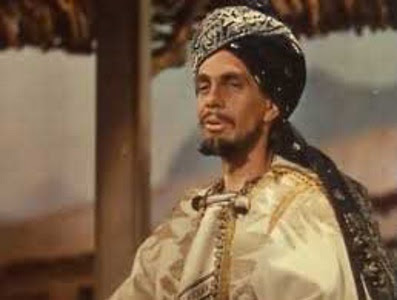The Drum
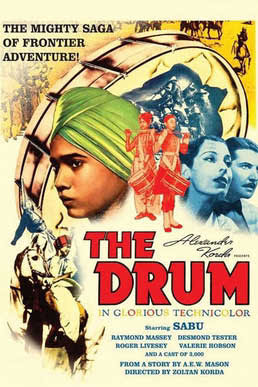
Director: Zoltan Korda
Year: 1938
Rating: 7.0
The Korda Brothers emigrated from Eastern Europe
and growing fascism to the safety and security of England and they showed
their appreciation to their adopted country by producing or directing a number
of films that basically flew the Union Jack and sang Hail Britannia. The
Scarlet Pimpernel, Sanders of the River, Fire Over England, That Hamilton
Woman, The Four Feathers and this film got them the friendship of Churchill
and the King. Both Alexander and Zoltan lived long enough to witness the
end of the British Empire and they and Churchill must have raised a few drinks
at their private clubs to the good old days. This film was made in 1938 when
England still ruled India and a large chunk of the world but with WW2 staring
them in the face. It was a good time for patriotism and bagpipes.
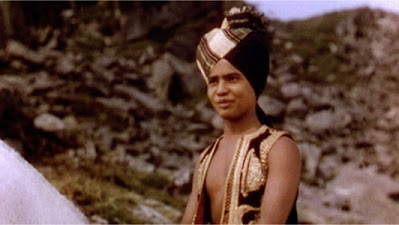
Still, you have to go back a hundred years
or so when the Raj was the Raj and India was seething under their rule. When
the sound of British troops on the march struck fear in the hearts of rebels.
When talley-ho could be heard in the woods. When Britain thought they were
saving civilization. It is a wonderfully romantic notion that Hollywood took
to even if it is only steeped in myth and Kipling. If you go into this film
with political correctness on your mind, you really should not bother. It
will only irritate you. The Brits are all honorable and courageous and the
Indians are all betrayers. Except of course for Sabu! Who actually received
a lot of criticism from Indians for accepting this role - an Indian Uncle
Tom. Sabu was never allowed to appear in a film in India.
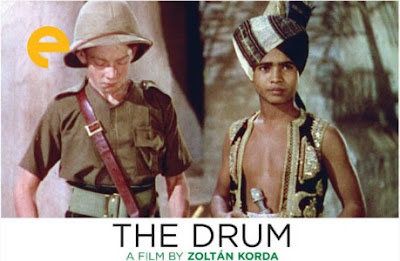
Sabu was picked out of total obscurity to
appear in a documentary titled Elephant Boy in 1937. His father was a mahout
(elephant trainer), so Sabu was comfortable around the animal. When Korda
was putting together a cast for The Drum, Sabu was his choice for the Indian
Prince. It made him famous. I have to wonder what Raymond Massey who had
already appeared in The Scarlet Pimpernel, Fire Over England and The Prisoner
of Zenda felt about being billed below this young boy. He was a villain in
those three films and is cast as one again. His perfect performance in Abe
Lincoln of Illinois was to break the type casting he was falling into. As
to Sabu, the American audience took a liking to him - for a while - with
The Thief of Bagdad, Jungle Book and Arabian Nights but once he was no longer
the charming boy actor - not so much. He died from a heart attack when he
was 39.
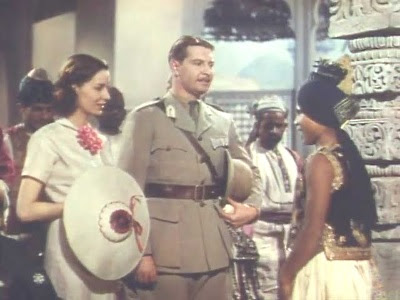
The British government is trying to bring
peace to the Indian Northwest - something they attempted to do time after
time - but the Muslims from there and across the border in Afghanistan were
constantly rebelling. Most of the Raj films take place in this area. Gunga
Din which was to come out a year after this followed a similar route. Gunga
with his trumpet, the Prince with his drums. Under the leadership of Captain
Carruthers (Roger Livesey - the standard understated wry British performance)
has signed a treaty with the ruler of Tokot and made friends with his son,
the young Prince Azim (Sabu). But as soon as the British leave, the ruler's
cousin Prince Ghul (Massey) assassinates him, takes over the throne and Azim
goes on the run to Peshawar. Ghul has plans for a full-scale rebellion of
all the tribes in the Northwest. All he needs to do is show them how easy
it is to kill British soldiers and Carruthers along with his wife (Valerie
Hobson) are returning to take up post with a contingent of soldiers. Come
into my web of machine guns he tells them. Shot in glorious Technicolor
and with a lot of location shooting in India, it looks fine though the copy
I saw had gone soft. Of course, this is all hooey - but when those bagpipes
play and they sing The Bonnie Banks o' Loch Lomond it is difficult not to
root for them.
